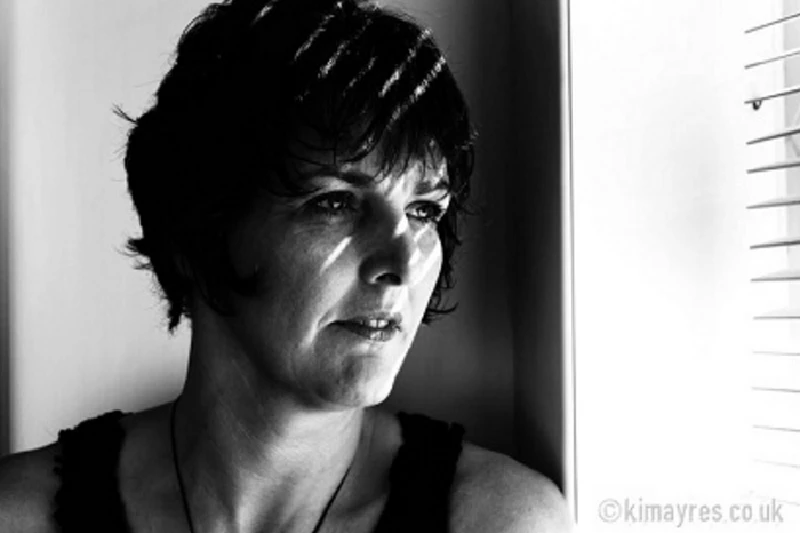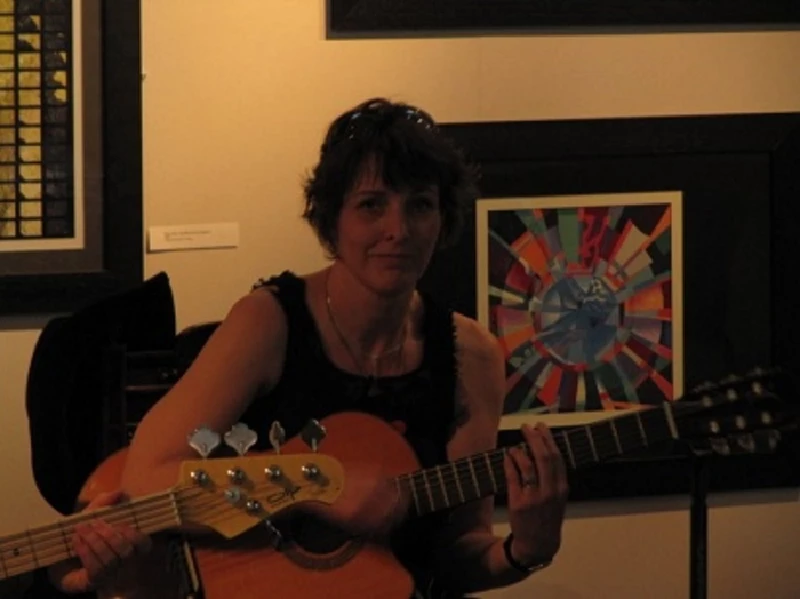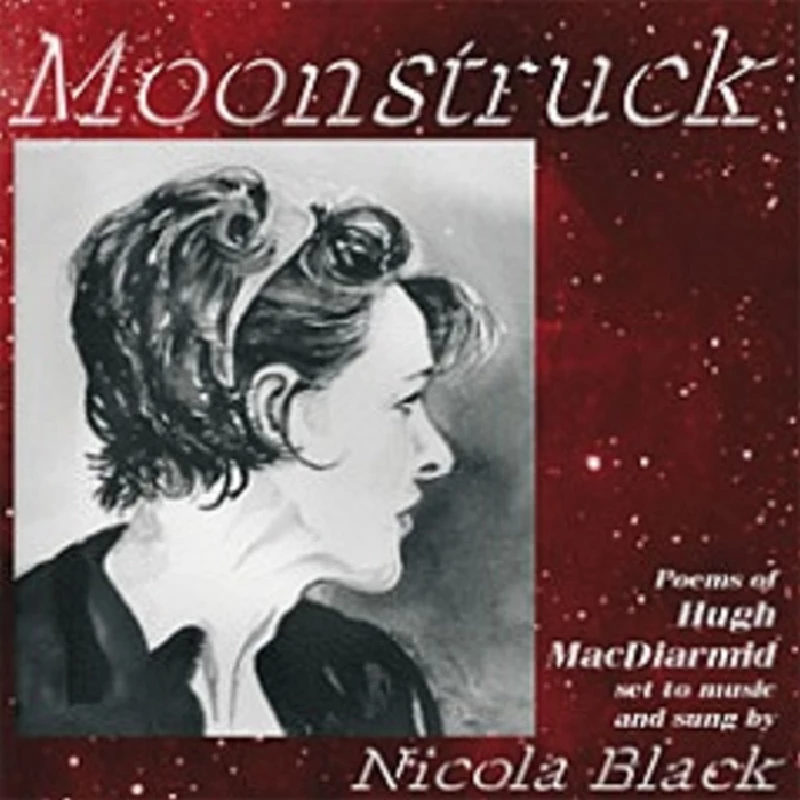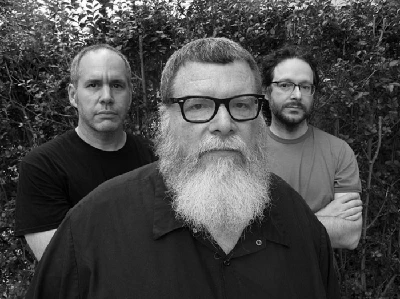Nicola Black - Interview
by John Clarkson
published: 16 / 4 / 2012

intro
John Clarkson talks to Scottish singer-songwriter Nicola Black about her debut solo album, 'Moonstruck', which sets to music the poems of poet Hugh MacDiarmid and her as-yet-untitled second solo album
Nicola Black is a singer, songwriter and musician from Dumfries and Galloway in the South West of Scotland. She first attracted attention with the jazz/folk/funk hybrid Quirkus, with whom she recorded an album, ‘Farewell to Treebeard’, in 2001, and which featured two of her own compositions. Her first solo album, ’Moonstruck’, a collection of sixteen poems by the Scottish poet Hugh MacDiarmid which she had set to music, came out on her own label, Nicola Black Music, in 2009. On several of the tracks on ‘Moonstruck’, Nicola sings a cappella, while on others Nicola, who plays guitar and piano, is accompanied by her regular backing musicians of husband Blackie (bass, flute, voice percussion) and Chris Lord (guitar, voice and piano). The remaining songs feature a band that consists of a revolving assortment of local Galloway fiddle players, accordionists and percussionists. Nicola is also one of the organisers of the Wickerman Festival, and will be playing, along with Duncan Maitland, the Cathode Ray and Roy Moller, Pennyblackmusic’s first Scottish gig and Wickerman Warm-up at The Bay in West Regent Street in Glasgow on June 15th. Pennyblackmusic spoke to Nicola Black about ‘Moonstruck’, and her as-yet-untitled second solo album which she is hoping to release next year. PB: You first of all became known for being a member of Quirkus. Was that your first band or have you played in other groups as well? NB: I have always played music with other people. I have been in dozens of bands, not all of them particularly well known, but I have played in everything from large funk bands to rock outfits to a cappella singing groups. PB: Does Quirkus still exist? NB: It does. We don’t play together as much as we used to, but it is still good fun when we do and we are working at the moment on our second album. PB: ‘Moonstruck’ was your first solo album. It is set to the poems of Hugh MacDiarmid. MacDiarmid was born in Langhol , which is also in Dumfries and Galloway. How well did you know his poems before you decided to set them to music? Were they something that you were brought up on? NB: No. I did know of Hugh MacDiarmid. He was quite a scary man who used to turn up on the telly and on the radio when I was a kid, and I did have a wee bit of knowledge of some of his stuff. We used to go to local poetry nights here years ago, and one of my local neighbours who is a MacDiarmid scholar asked if I could set ‘The Little White Rose’ to music. It went from there and grew into a large album (Laughs). PB: You focused almost entirely on his early poems. Why did you do that? Was it because his early poems were written in Scots rather than English? NB: It was because of the metering. A lot of his early Scots poems fit in very well with music. When he started to write in English, a lot of the poems were in blank verse and fitted in less well. I have used a couple of his poems from ‘Revolutionary Art’, which are in English and which was a collection that came out after his death in 1978. PB: When Mike Scott from the Waterboys adapted WB Yeats’ poems for his album ‘An Appointment with Mr. Yeats’ last year, he had to make a lot of minor changes to the words to make them fit in with the music. Did you decide to that too? NB: No, I absolutely refused to do that. There isn’t anything that I have changed. I had some pronunciation fights though with other people, but I decided that I wasn’t going to change anything. There were poems that I could have used if I had changed things. Part of it was that I didn’t have the confidence to do that. It was more than that though. I wanted to use those poems that sang to me. If you read it and it sings back to you, it makes it much easier to fit together. It meters back at you. PB: Did that limit you in which poems that you could use? NB: No. There were quite a lot more that I could have used. A lot of poems were wonderful, but also really lengthy. I used an extract, for example, from ‘A Drunk Man Looks at a Thistle’. I could have done a whole album on ‘A Drunk Man Looks at a Thistle’, which came out in 1926 and was his huge opus work, but a lot of the extracts from that were too long. PB: It took you five years to make ‘Moonstruck’. Why did it take you so long to make that album? NB: I fell out with Hugh MacDiarmid (Laughs). As a human being, he was not the nicest of men. His political views were pretty extreme, and he was at different points involved with both communism and fascism. He was also a huge showman. Publicity was very high on his agenda and he was very big headed. He was angry because he didn’t think that people respected him as much as they should, yet in a lot of ways he did nothing to try to get that respect. He was a very good writer and I loved a lot of his poems, but I had real trouble with him as a person. It is really weird to immerse yourself in another person’s work. People keep coming to me and saying, “Can you set this for me?” or “What about this poem. What about that poet?,” but I don’t know if I would ever do it again. PB: How easy was it developing your own song writing while focusing on MacDiarmid? NB: It was quite difficult. I have been performing my own stuff for years. I just never got around to recording it, and then the MacDiarmid stuff took precedence. I am putting together an album of my own stuff now. There is all this old material that I have already recorded for it. I also went to the States last year to do a wee tour there, and that trip was a total inspiration. I started to write like nobody’s business when I was there, and I want to put some of those songs on the album as well. PB: Where did you play over there? NB: I was mostly East coast. I was in New York, and what I call “the East Kilbride” area of Baltimore and Washington. The guy who got me over was based around there, and it is this huge suburb and urban area. I played various gigs there in places like Rockville and Laurel, where I stayed for a week, and also in Wheaton in Maryland. PB: You said that it gave you impetus to write. What are the songs that you wrote there about? Are they about your experiences in America or something else entirely? NB: Some are. A couple of them are really wordy experience songs. Others are about not being at home and thinking about what is going on there. My husband was with me and we stayed in motels. They were alright, but we definitely felt we were in motel land. We would go through a door and find ourselves in a corridor that was nearly the same, but not quite the same as the one we had come from. We would get into towns at ten at night and not know where anything was, and you would forget where you are when you woke up. There are songs about that lost feeling you can sometimes get when you are travelling, and about being disorientated and the effects, both good and bad, it can have on your relationship. PB: How long were you there for? NB: Just over two weeks. It felt like forever, but it was really good as well. I really enjoyed it. At the same time I wouldn’t want to do much more than that. PB: When are you hoping to release the album? NB: I am hoping to get it out early next year, and maybe in the spring. PB: Are you going to do what you did with ‘Moonstruck’ and use a rotational group of musicians? NB: There is going to be one or two a capella tracks, but there is going to a lot less of that on this album and most of the tracks will involve a band. Chris who is the engineer as well as the guitarist, Blackie and myself will once again be the main stalwarts on this album. We have worked together for many years on various projects. PB: You also organise the Acoustic Village at the Wickerman Festival. How long have you done that for? NB: I have done it for nine out of the eleven years. It is a fun festival and quite family orientated, but not entirely. The media keep talking about not being able to explain why it works, but I think that is probably why it does. PB: And finally what can we expect from you at the Bands’ Night/Wickerman Warm-Up? What are you going to be doing during your set? NB: It is going to be me and Blackie, and we are going to play a mix of stuff. There will some new stuff, a few old bits and a couple of the MacDiarmid songs because they always go down very well. We are really looking forward to it and very excited about it. PB: Thank you. Nicola Black will be playing the Pennyblackmusic Bands’ Night and Wickerman Warm-Up with Ducan Maitland, the Cathode Ray and Roy Moller on the 15th June at The Bay at 142 West Regent Street, Glasgow, G2 2RQ.
Picture Gallery:-


most viewed articles
current edition
Carl Ewens - David Bowie 1964 to 1982 On Track: Every Album, Every SongArmory Show - Interview with Richard Jobson
Colin Blunstone - Thalia Hall, Chicago, 16/7/2025
Visor Fest - Valencia, Spain, 26/9/2025...27/9/2025
Bathers - Photoscapes 1
John McKay - Interview
Loft - Interview
Billie Eilish - O2 Arena, London, 10/7/2025
Robert Forster - Interview
Sir Tim Rice - Interview
previous editions
Heavenly - P.U.N.K. Girl EPManic Street Preachers - (Gig of a Lifetime) Millennium Stadium, Cardiff, December 1999
Beautiful South - Ten Songs That Made Me Love...
Oasis - Oasis, Earl's Court, London, 1995
Pixies - Ten Songs That Made Me Love...
Boomtown Rats - Ten Songs That Made Me Love....
Trudie Myerscough-Harris - Interview
Prolapse - Interview
Simon Heavisides - Destiny Stopped Screaming: The Life and Times of Adrian Borland
Peter Perrett - In Dreams Begin Responsibilities Interview Part One
most viewed reviews
current edition
Amy Macdonald - Is This What You've Been Waiting For?Sick Man of Europe - The Sick Man of Europe
Lucy Spraggan - Other Sides of the Moon
Davey Woodward - Mumbo in the Jumbo
Phew, Erika Kobayashi,, Dieter Moebius - Radium Girls
Alice Cooper - The Revenge of Alice Cooper
Bush - I Beat Loneliness
Suzanne Vega - Flying With Angels
Blueboy - 2
Cynthia Erivo - I Forgive You
related articles |
|
Willard Grant Conspiracy/Big Hogg: Feature (2015 |

|
| We profile our next Pennyblackmusic Bands Nights which will feature the Willard Grant Conspiracy and Big Hogg at the Glad Cafe in Glasgow on Thursday 10th September and the Wee Red Bar in Edinburgh on Friday 11th September |
Pennyblackmusic Regular Contributors
Adrian Janes
Amanda J. Window
Andrew Twambley
Anthony Dhanendran
Benjamin Howarth
Cila Warncke
Daniel Cressey
Darren Aston
Dastardly
Dave Goodwin
Denzil Watson
Dominic B. Simpson
Eoghan Lyng
Fiona Hutchings
Harry Sherriff
Helen Tipping
Jamie Rowland
John Clarkson
Julie Cruickshank
Kimberly Bright
Lisa Torem
Maarten Schiethart